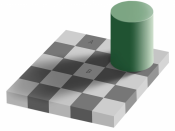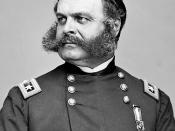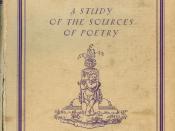"Lost in the Funhouse" explores the many layers of the theme "illusion of reality." This concept is first introduced in the second paragraph as the explanation of initials or blanks replacing proper names in fiction-writing. The "attempt" at disguising a place name by shortening it, is really a tool used by authors to make a place seem real, in need of disguising. John Barth explains that this tactic is merely an "illusion of reality." In the following pages of this story, the theme "illusion of reality" is present in the funhouse and self-perception during adolescence.
The illusion of reality is a concept manifested in a funhouse. The funhouse itself is an illusion, with its rooms of mirrors that distort reality, moving floors and walls that disorient you, and its mazelike qualities that take you away from the realities of life. A funhouse is an alternative world, one meant for lovers embarking on a new adventure together.
Ambrose can see its falseness from his single perspective and is aware of its deceptive powers. He is aware of the perversion inherent in the funhouse, the sleazy goals of sexual gratification disguised as child-like pleasures. To be lost in a funhouse is symbolic of the confusing and disorienting aspects of adolescence and particularly the sexual aspects of puberty.
One's perception of the self during adolescence can also be an illusion of reality. At one point in the story, we are led to believe that Ambrose is to be forever lost in this funhouse. This is representative of Ambrose's fear that he will die illusioned, never sure of who he really is. Being lost in a funhouse alone is very much like particularly painful stages of adolescence. It is a place of romance, but for Ambrose it is a scary and confusing...


